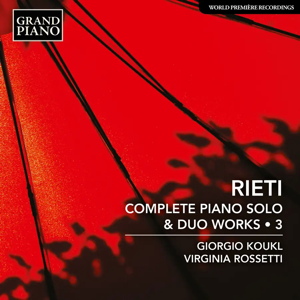
Vittorio Rieti (1898-1994)
Complete Piano Solo & Duo Works Volume 3
Giorgio Koukl, Virginia Rossetti (pianos)
rec. 2024, Studio Bottega de Pianoforte, Lugano, Switzerland
First recordings
Grand Piano GP955 [60]
As we learned from the previous volumes, Vittorio Rieti acknowledged his love for dance and music for the stage and its influence on his compositional output. Once again, this is evident right from the start of this CD. It is remarkable that, as the booklet notes point out, he was able to find new and fresh takes on this ongoing theme. The first seven works were all written in his later years, the Rondo for two pianos, as late as at the age of 91. All of them are full of a zest for life and could easily have been written by someone decades younger. The opening Scherzo-March is a charmingly jaunty little piece that easily brings a smile to your face as it bounces along. Then comes a theme and nine variations, ending with a coda, entitled Variazioni enarmoniche, written when Rieti was 88. It is a tunefully rich work and the serious nature of its opening theme is soon dispelled when the variations begin and like the opening work it skips along. Next, and twice more along the way, we have, as the notes describe, a similar device as appears in Mussorgsky’s Pictures at an Exhibition, namely a short linking motif, acting much like a change of scenery to herald the next variation. They are all of them in the style we have come to expect: easy, joyous and designed to please – which they do over and over again. The work’s closing coda gives pause for thought, ending on a gentle note. Following the brief, though no less enjoyable, Improvviso, we have the Triptych, which Rieti dedicated to his friend, harpsichordist Sylvia Marlowe. Its outer sections, with their dancing demeanour, sandwich a more reflective and personal mood. Introduzione e bagatelle is again cast in Rieti’s winning combination of the gaily carefree and elegance. Moonlight Dance is a cleverly reworked Au clair de la lune and Rieti’s late works conclude with the Rondo for two pianos which emphasises in music what Rieti showed in life: a powerfully assertive drive to enjoy living. This work, written when he was aged 91, shows that attitude in spades.
The remaining ten pieces are from much earlier in Rieti’s career. His three marches for creatures, written in his twenties show that he was already a highly creative and talented composer and pianist. This solo piano work embodies the characteristic charm and invention we have come to expect from him. It opens with ‘Funeral March for a Little Bird’ in which you can hear echoes of his singing voice, making it all the more poignant; however, he flies off at the end to his new reality. Next is a ‘Wedding March for a Crocodile’ in which the animal’s lumbering gait is perfectly described. The final part is a ‘Military March for the Ants’; their highly organised procession captured as effectively as if it was a piece of film, with the left hand making their final disappearance down to their home beneath the ground a musical full stop. Rieti’s earliest work on the disc is his Pastorale from 1920, which is sadly wistful though it has its more expansive moments before reverting to its more inward-looking nature. Valentine Waltz at just over a minute was meant for a ballet dancer whose career came to an abrupt end through paralysis while on tour. It shows Rieti’s prowess in creating truly telling miniatures. Another such tiny fragment comes in the shape of Meditazione In Istile Di Ricercare, whose date of composition is unknown but his ability to show a thoughtful nature is in no doubt. His Alla francese from 1961 is in Rieti’s preferred dance form and displays both elegance and energy. The disc closes with his Tre preludi from 1927, 1930 and 1931. The first alludes to Bach while the second is more than a straightforward march, as it is adorned with Rieti’s joy of living. The last notes form an Allegro impetuoso, though still in dance form, allowing the disc to sign off with an image of dancers on stage, Rieti’s beloved stage, for which he composed so many wonderfully descriptive works.
These discs reveal a composer who will reward all who get to know his music; his dedication to writing winning tunes stood him in good stead throughout his long life and his passion for life itself constitutes a strong message in favour of making every moment count. Both Giorgio Koukl and Virginia Rossetti are clearly convinced of Rieti’s worth, as their commitment to his music is obvious at every turn. These world première recordings do his compositions proud; no one could fail to enjoy such effervescent music that always leaves one feeling energised.
Steve Arloff
Buying this recording via a link below generates revenue for MWI, which helps the site remain free.



Contents
Scherzo-March for two pianos (1976)
Variazioni Enarmoniche for two pianos (1986)
Improvviso for two pianos (1979)
Triptych for two pianos (1982)
Introduzione e Bagatella for two pianos (1978)
Moonlight Dance for two pianos (1978)
Rondo for two pianos (1989)
Tre Marcie Per La Bestie (pub.1922)
Pastorale (1920)
Valentine Waltz (1956-57)
Meditazione In Istile Di Ricercare (date unknown)
Alla Francese (1961)
Tre Preludi (1927, 1930, 1931)

















